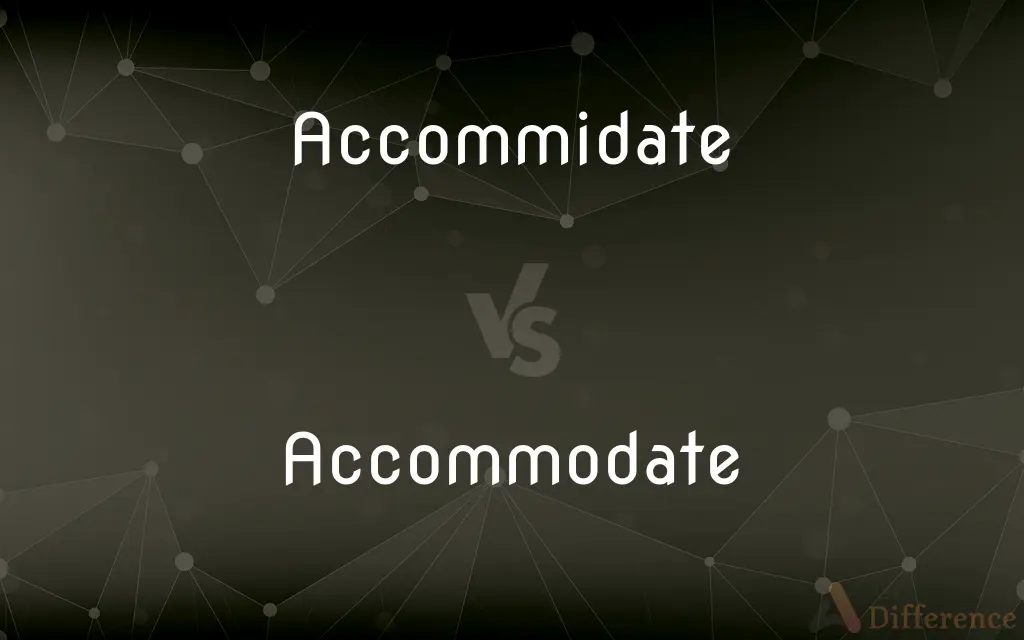Accommidate vs. Accommodate — Which is Correct Spelling?
By Tayyaba Rehman — Updated on March 28, 2024
"Accommidate" is incorrect. The right spelling is "Accommodate," meaning to make space or adapt for something or someone.

Table of Contents
Which is correct: Accommidate or Accommodate
How to spell Accommodate?

Accommidate
Incorrect Spelling

Accommodate
Correct Spelling
ADVERTISEMENT
How Do You Spell Accommodate Correctly?
Incorrect: The hotel was unable to accommidate our request for an early check-in.
Correct: The hotel was unable to accommodate our request for an early check-in.
Incorrect: The seating arrangement didn't accommidate all the guests comfortably.
Correct: The seating arrangement didn't accommodate all the guests comfortably.
Incorrect: We need to find a way to accommidate more participants in the conference.
Correct: We need to find a way to accommodate more participants in the conference.
Incorrect: The budget does not accommidate for unexpected expenses.
Correct: The budget does not accommodate for unexpected expenses.
Incorrect: Can the program be changed to accommidate the speaker's schedule?
Correct: Can the program be changed to accommodate the speaker's schedule?
ADVERTISEMENT
Accommodate Definitions
(of a building or other area) provide lodging or sufficient space for
The cottages accommodate up to six people
Fit in with the wishes or needs of
Any language must accommodate new concepts
To have enough space for
A parking lot big enough to accommodate buses.
To provide lodging for
We looked for a hotel to accommodate the extra guests.
To take into consideration or make adjustments for; allow for
An economic proposal that accommodates the interests of senior citizens.
To do a favor or service for; oblige.
To provide for; supply with something needed
Accommodated the expedition with supplies.
To make suitable; adapt or adjust
Accommodated herself to her new surroundings.
To adapt oneself; become adjusted
It is never easy to accommodate to social change.
(Physiology) To become adjusted, as the eye to focusing on objects at a distance.
To render fit, suitable, or correspondent; to adapt.
To accommodate ourselves to circumstances
(transitive) To cause to come to agreement; to bring about harmony; to reconcile.
To accommodate differences
(transitive) To provide housing for.
To accommodate an old friend for a week
To provide sufficient space for
(transitive) To provide with something desired, needed, or convenient.
To accommodate a friend with a loan
(transitive) To do a favor or service for; to oblige.
(transitive) To show the correspondence of; to apply or make suit by analogy; to adapt or fit, as teachings to accidental circumstances, statements to facts, etc.
To accommodate prophecy to events
(transitive) To give consideration to; to allow for.
(transitive) To contain comfortably; to have space for.
This venue accommodates three hundred people.
To adapt oneself; to be conformable or adapted; become adjusted.
To change focal length in order to focus at a different distance.
(obsolete) Suitable; fit; adapted; as, means accommodate to end.
To render fit, suitable, or correspondent; to adapt; to conform; as, to accommodate ourselves to circumstances.
To bring into agreement or harmony; to reconcile; to compose; to adjust; to settle; as, to accommodate differences, a dispute, etc.
To furnish with something desired, needed, or convenient; to favor; to oblige; as, to accommodate a friend with a loan or with lodgings.
To show the correspondence of; to apply or make suit by analogy; to adapt or fit, as teachings to accidental circumstances, statements to facts, etc.; as, to accommodate prophecy to events.
To adapt one's self; to be conformable or adapted.
Suitable; fit; adapted; as, means accommodate to end.
Be agreeable or acceptable to;
This suits my needs
Make fit for, or change to suit a new purpose;
Adapt our native cuisine to the available food resources of the new country
Provide with something desired or needed;
Can you accommodate me with a rental car?
Have room for; hold without crowding;
This hotel can accommodate 250 guests
The theater admits 300 people
The auditorium can't hold more than 500 people
Provide housing for;
We are lodging three foreign students this semester
Provide a service or favor for someone;
We had to oblige him
Make compatible with;
The scientists had to accommodate the new results with the existing theories
Accommodate Meaning in a Sentence
The new office space can accommodate up to 100 employees.
The parking lot is large enough to accommodate all visitors.
The hotel offers adjustable beds to better accommodate guests with disabilities.
The software can be customized to accommodate the company’s requirements.
Our services are designed to accommodate businesses of all sizes.
They made an effort to accommodate the dietary restrictions of all their guests.
To accommodate the growing number of students, the school decided to build a new wing.
The policy was changed to better accommodate customer feedback.
Teachers need to accommodate different learning styles in their classrooms.
The couch is too big to accommodate in the small apartment.
Can we accommodate another chair at this table?
To accommodate the demand, the manufacturer increased production.
The theater can accommodate 500 people at full capacity.
The budget should accommodate for inflation rates.
Online platforms accommodate a wide range of digital content.
The schedule was adjusted to accommodate the needs of the participants.
The plan was revised to accommodate the feedback from the community.
Work hours are flexible to accommodate employees' family commitments.
The city must accommodate the influx of tourists during the festival.
The new model of the phone is designed to accommodate a larger battery.
To accommodate her interest, the club introduced a new program.
The system is flexible enough to accommodate any changes.
The curriculum has been updated to accommodate the latest educational standards.
Local laws accommodate various traditional practices.
Accommodate Idioms & Phrases
Stretch to accommodate
To extend resources or capacity to accommodate more than what was originally planned or expected.
The budget was stretched to accommodate the additional expenses of the event.
Go out of one's way to accommodate
To make a special effort to accommodate someone's needs or wishes.
He went out of his way to accommodate his team, ensuring they had everything needed for the project.
Bend over backwards to accommodate
To try very hard to accommodate someone's needs or requests.
The staff bent over backwards to accommodate the guests’ unusual requests.
Adapt to accommodate
To change or adjust something to better accommodate a person, situation, or need.
The program was adapted to accommodate learners of different levels.
Make room to accommodate
To create space or opportunity to accommodate someone or something.
They rearranged the furniture to make room to accommodate the new TV.
Common Curiosities
What is the root word of Accommodate?
The root word is the Latin "accommodatus."
What is the plural form of Accommodate?
N/A, as "accommodate" is a verb.
What is the pronunciation of Accommodate?
/əˈkɒməˌdeɪt/
Why is it called Accommodate?
The term originates from Latin "accommodatus," meaning to make fit, adapt, or suit.
Which preposition is used with Accommodate?
"To" as in "accommodate to someone's needs."
What is the verb form of Accommodate?
Accommodate is already a verb.
Which vowel is used before Accommodate?
The vowel "a."
What is the singular form of Accommodate?
Accommodate is a verb, so it doesn't have a singular or plural form.
Is Accommodate a negative or positive word?
Neutral.
Is Accommodate a collective noun?
No.
Which conjunction is used with Accommodate?
Standard conjunctions like "and" or "but" can be used.
Is Accommodate an abstract noun?
No, but its noun form "accommodation" can be.
Is Accommodate a countable noun?
"Accommodate" is a verb; its noun form "accommodation" can be countable.
What part of speech is Accommodate?
Verb.
Which article is used with Accommodate?
"An" when referring to the act itself, e.g., "an accommodation."
Is Accommodate a vowel or consonant?
It's a word, not a single letter. It begins with the vowel "a."
Is the Accommodate term a metaphor?
Not inherently, but can be used metaphorically.
How many syllables are in Accommodate?
Four.
What is the opposite of Accommodate?
Inconvenience.
What is the first form of Accommodate?
Accommodate.
Is the word Accommodate a Gerund?
"Accommodating" is the gerund form.
Is the word “Accommodate” a Direct object or an Indirect object?
As a verb, it can take a direct object.
How do we divide Accommodate into syllables?
Ac-com-mo-date.
What is a stressed syllable in Accommodate?
The third syllable "mo."
What is another term for Accommodate?
Adapt.
Which determiner is used with Accommodate?
Determiners like "this," "that," "any," etc., can be used with its noun form "accommodation."
How is Accommodate used in a sentence?
The meeting room can accommodate up to 50 people.
Is Accommodate a noun or adjective?
It's primarily a verb.
Is Accommodate an adverb?
No.
Is the word Accommodate imperative?
It can be, e.g., "Accommodate the guests in room 101."
What is the second form of Accommodate?
Accommodated.
What is the third form of Accommodate?
Accommodated.
Share Your Discovery

Previous Comparison
Marketting vs. Marketing
Next Comparison
Shoose vs. ShoesAuthor Spotlight
Written by
Tayyaba RehmanTayyaba Rehman is a distinguished writer, currently serving as a primary contributor to askdifference.com. As a researcher in semantics and etymology, Tayyaba's passion for the complexity of languages and their distinctions has found a perfect home on the platform. Tayyaba delves into the intricacies of language, distinguishing between commonly confused words and phrases, thereby providing clarity for readers worldwide.


































